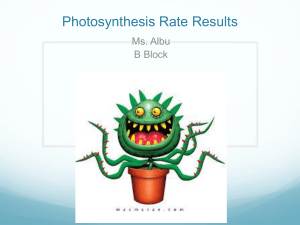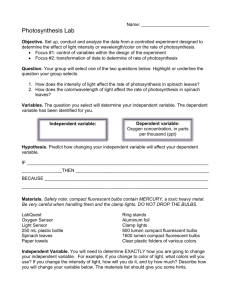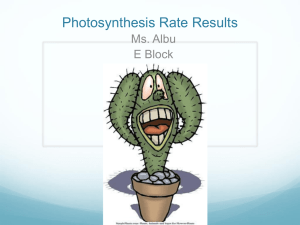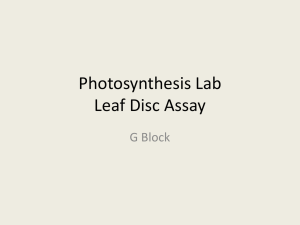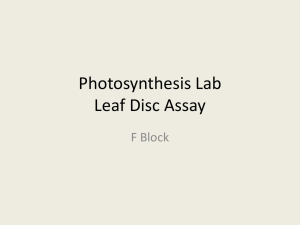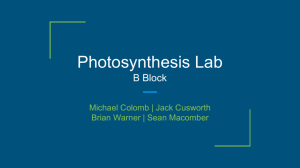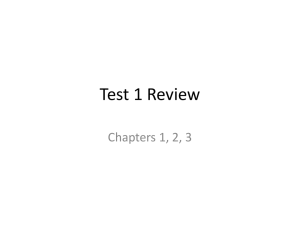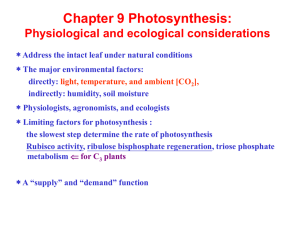A Block - Westford Academy Ap Bio
advertisement
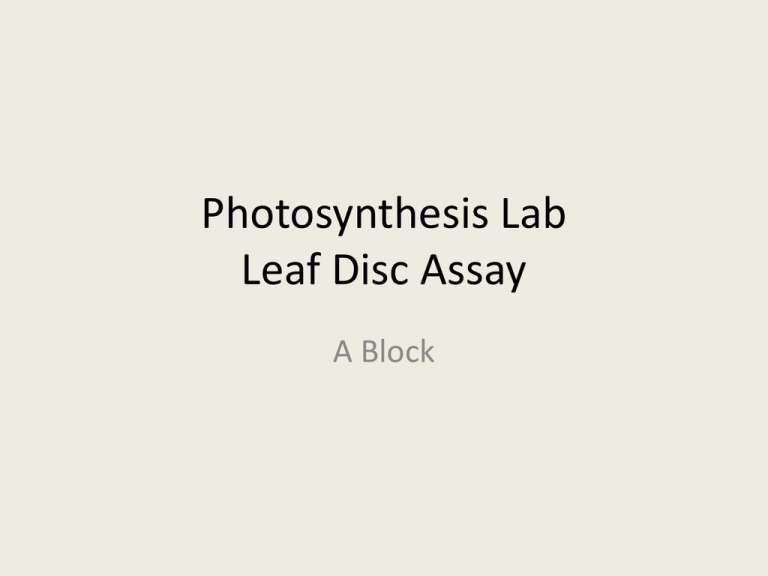
Photosynthesis Lab Leaf Disc Assay A Block Spinach (Control) Arugula Number of Discs Floating Time (seconds) Number of Discs Floating Time (seconds) 1 10 1 57 2 20 2 69 3 27 3 79 4 36 4 79 5 36 5 88 6 40 6 88 7 40 7 109 8 40 8 148 9 52 9 155 10 56 10 163 11 66 11 173 12 76 12 224 .16 discs/sec .05 discs/sec rate = 0.16 discs/sec ● Spinach had a rate that was more than three times higher than arugula ● The spinach was darker than the arugula, indicating higher concentrations of chlorophyll, which could have led to its higher rate ● The first arugula disc floated in the same amount of time that 10 spinach discs floated Spinach Leaf v. Maple Leaf Photosynthetic Rate Our group found that the spinach leaf had a higher photosynthetic rate than the maple leaf. All the spinach leaf discs were able to float to the top of the solution in under four minutes, whereas not all of the maple leaf discs were able to float to the top in the ten minute span given. Amy Keum, Sharon Jiang, Jess Barry, Sydney Kim Photosynthetic Rate of Spinach vs. Hibiscus Leaves Hypothesis: If the photosynthetic rates of hibiscus and spinach leaves are compared, then lighter green hibiscus leaves will have a lower rate of photosynthesis than darker green spinach leaves. ● ● ● ● ● ● A 200 Watt bulb at a height of 12 inches was used to provide light for photosynthesis. 150 mL of a sodium bicarbonate and detergent solution was used for each trial. No measurable photosynthetic activity was observed in the Hibiscus leaves1. The spinach chads began floating after 210 seconds. Spinach displayed an overall photosynthetic rate of .13% chads/second while the hibiscus plant displayed an overall photosynthetic rate of 0% chads/second over a period of 10 minutes. This evidence supports not rejecting the hypothesis. 1 Activity was observed beyond the experimental observation period, confirming that the leaves were still alive and supporting the validity of the data. Michael Colavita, Shanon Fan, Zach Kettering, and Becca Tibbitts Comparing the Rates of Photosynthesis Between Spinach and Rhododendron Plants By: Anagha Iyengar, Raymond Huang, Julia Tseng, and Jasmine Gutbrod Spinach (Spinacia oleracea) → Edible annual native to central Asia → High nutritional value due to its abundance of vitamin A, vitamin C, vitamin K, Manganese, and Iron, along with other essential minerals → Fresh spinach loses much of its nutritional value after a few days Rhododendron (Rhododendron ferrugineum) → Type of “woody” plant → Considered native to the Alpine regions but are found across North America, Europe, Russia, Asia, Greenland, and Australia → Common ornamental plant due to its hardy characteristics and pleasant flowers Hypothesis + Overview → If the rates of photosynthesis of spinach and rhododendron leaves are tested, then <><><> will have the highest rate of photosynthesis. <explain why we think this> → The rates were calculated by the number of leaf discs of each plant type that rose to the surface after being submerged in a water, sodium bicarbonate, and detergent solution per minute. Data Tim e (Mi n.) .5 1 Numb er of Floati ng Spinac h Discs 0 1 1. 5 2 5 2. 5 3 9 3. 5 4 9 4. 5 5 5. 5 1 0 6 6. 5 7 7. 5 8 8. 5 9 9. 5 - - - - - - - - 10 9 Numb er of Floati ng Observing how many leaf discs rise to the top of the solution in ten minutes. Rhodo . Discs 0 0 1 2 2 4 4 4 4 4 6 8 8 8 8 8 8 9 9 Analysis <conclusionish wrap-up> Image Sources http://www.freewallsource.com/green-wallpaper-7620.html http://echolife.files.wordpress.com/2011/09/baby-spinach-leaves.jpg http://thelifeofyourtime.files.wordpress.com/2010/11/dscf7286.jpg Kunal Aggarwal Lilly Keele Rachel Morey Hannah Rosenstein A Block Photosynthesis Lab Independent Variable = Type of plant Dependent Variable = Rate of photosynthesis Control = Baby spinach leaves Experimental = Romaine lettuce Findings: ● Rate of Photosynthesis of Spinach = 14/360 = 0.039 floats/sec ● Rate of Photosynthesis of Lettuce = 12/360 = 0.033 floats/sec ● Similar overall rate of photosynthesis (both reached 100% floating discs at 6 minutes, but had different disc totals because not all discs started sunken) ● Occurred at different paces ○ Spinach rate started slower but sped up ○ Lettuce rate started faster but slowed down (initially appeared to have a higher rate)
